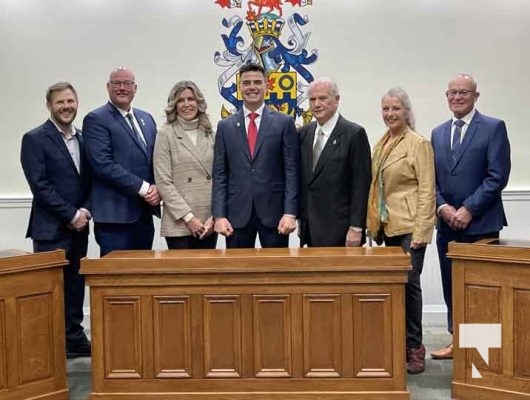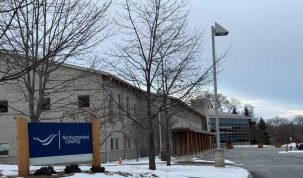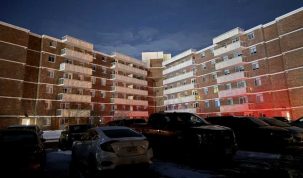By Cecilia Nasmith/Today’s Northumberland
Polite discussion of one of the newest pieces of legislation out of Queen’s Park is difficult for some members of Cobourg’s municipal council.
This confession came out Monday at a special meeting – the day Bill 23, the More Homes Built Faster Act, became law, even though the window for comment is open for a few more days.
Mayor Lucas Cleveland was one of a contingent of local mayors at a meeting Friday to discuss the bill with Northumberland-Peterborough South MPP David Piccini.
“To say it was a difficult meeting for MPP Piccini would be an understatement,” Cleveland said.
“The mayors definitely had some not-so-nice words.”
“I really have no diplomatic and nice response to Bill 23 – that is where I’m going to stop,” Councillor Miriam Mutton stated.
Director of Building and Planning Anne Taylor Scott said that the bill, which was introduced Oct. 25, is considered an Omnibus Bill, since it changes nine existing pieces of legislation.
“Many, many changes – quite overwhelming,” she said.
Its stated aim is to create 1.5-million homes at the rate of 150,000 annually over the next decade. This would represent a 50% increase over the 100,000 homes built in Ontario each year. This acceleration will be fueled by such measures as removing environmental-review and -protection measures and eliminating opportunities for public input and appeals.
She did find a few positive things about the bill, such as incentives that apply to affordable housing and the elimination of frivolous appeals. But she also set out some of the particulars that most stand to affect the town.
Scaling back the role of conservation authorities – Agencies like the Ganaraska Region Conservation Authority are now limited to what expertise they can offer (such as notifying of such hazards as steep slopes), with the result that setbacks and buffer areas will be reduced. They will not be allowed to share their expertise in such areas as water-resource engineering, leaving the town to go to the trouble and expense of getting it elsewhere. As well, Conservation Authorities are under pressure to free up their own protected lands for development. Results to the town will include setbacks to their climate-change efforts and such efforts as flood attenuation, potentially leading to increased liability and higher insurance costs.
Overhauling the development-charges framework – Development is theoretically a cost-recovery exercise, with fees and charges calculated to cover the infrastructure costs of the growth (extended roads and water networks, for example) occasioned by additional construction. With these costs not covered, this means delayed infrastructure projects and increased taxes to offset the loss of these fees.
A use-it-or-lose-it approach to heritage conservation – A two-year limit now applies to heritage homes under consideration for official designation. Otherwise, they’re off the registry for five years.
This puts pressure on staff making the assessments for (currently) some 200 properties.
Third units are permitted – In the name of densification, third units are encouraged for existing residences. This presents challenges to provide adequate water, sanitary-sewer and other services.
As well, only one parking space will be required per dwelling. The results may be significant impacts on on-street parking demands and increases in complaints and bylaw-enforcement requirements.
Removing items to be reviewed as part of site-plan approval – This applies primarily to design, architectural and landscaping elements. And while some developments are presented to the town with good design and landscaping, Taylor Scott said, that’s not always the case.
Acquiring and providing for parkland – This will no longer be part of requirements imposed on larger developments. And with densification increasing, so will the demand for parkland.
While one must agree measures are needed to address housing shortages, Taylor Scott said, the unintended consequences of the measures she spotlighted have potentially detrimental impacts.
Treasurer Ian Davey returned to the increased infrastructure requirements that will have to be built at some point.
“The whole idea of development charges is, every property that is developed contributes a piece towards that and, over time, these funds are built up,” Davey explained.
“Charges will have to increase even further to try to increase those funds that have been lost. It will be up to the municipal council of the day to decide whether they want to take on additional debt load to pay for these additional infrastructure projects, or maybe choose not to develop them.”
No Cobourg-specific figure has been estimated, but Mayor Lucas Cleveland recalled an estimate he heard at a meeting of Northumberland County mayors that, at county level, the changes represent an estimated $2.5-million loss in development charges each year.
Chief Administrative Officer Tracey Vaughan cited figures from the Association of Municipalities of Ontario that estimated a $1-billion annual loss to municipalities across the province.
“There are no concrete estimates, but a lot of organizations are running those scenarios,” Vaughan said.
As council’s representative on the Ganaraska Region Conservation Authority in the past, Councillor Brian Darling felt he had to speak.
“It always makes the news whenever there’s a big flood and houses are lost. Most of the time, they should never have been built there. The GRCA prevents that,” Darling pointed out.
When that prevention mechanism is removed, when houses are again built where they probably shouldn’t be, he predicts dire results for the taxpayer and for everyone’s insurance rates
























